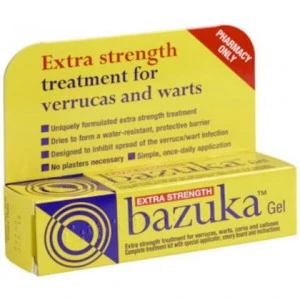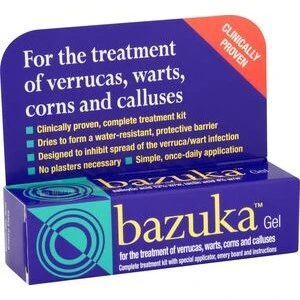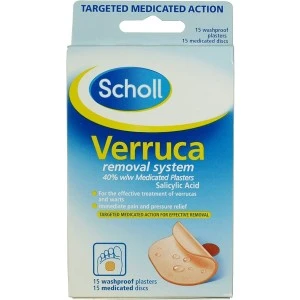Warts and Verrucas
We offer a range of wart and verruca treatments. Our online prescribers are available to discuss our products and help you find the right one for your needs.
Bazuka Extra Strength Gel
- Kills the virus
- Softens hard skin
- Available without a prescription
Bazuka Gel
- Easy to use
- Softens warts
- Available without a prescription
Scholl Verruca Removal System
- Protects verruca
- Softens skin
- Kills the virus
What Are Warts & Verrucas
Warts and verrucas are common skin conditions that cause lumps on the surface of the skin. They can appear as a single rough patch of skin or as many small pale dots on the skin.
While warts can be uncomfortable and embarrassing, they are usually benign.
Nonetheless, if a wart is causing you distress, or if it grows or changes colour, get it checked by your doctor.
What's the difference between a wart and a verruca?
A verruca - also known as a plantar wart - is a wart that develops on the bottom of your foot. Verrucas can cause pain when standing or walking.
Much like how jock-itch is the name given to a ringworm infection of the groin, verruca is the name given to a wart on the sole of the foot.
What causes warts?
Warts and verrucas are caused by the human papillomavirus (HPV). The virus encourages the skin to produce an excessive amount of keratin, the protein that makes up hair and nails.
Excessive keratin builds up to create a hard growth on the skin's surface.
HPV can be passed on through skin-to-skin contact and contact with the warts themselves. It can also be transmitted through contaminated surfaces, although this mode is less common.
You are more likely to spread warts if the skin is wet or damaged. Keeping the site of a wart dry and covered can help prevent the spread of infection to others.
Is there a cure for HPV?
While there is currently no cure for HPV, there are various treatments available to treat the warts that the virus causes, including products readily available over the counter from pharmacies.
A vaccine is available for HPV, though this only prevents the strain of HPV responsible for genital warts. In the UK, the vaccine is routinely given to teenagers in two stages. However, the HPV vaccine does not prevent you from getting verrucas and warts caused by other strains.
Given time, your body's immune system can naturally eradicate the virus from the body. However, this can take several years for the virus to be removed naturally. The time it takes for the virus to be removed varies from person to person.
How are warts and verrucas treated?
There are various treatments available for warts and verrucas, including topical creams and ointments, sprays, and plasters.
Depending on the size, severity, and location of the warts, some treatments may be more suitable than others.
Genital warts require specialised treatments, due to the sensitive skin of the genitals.
Treatments for warts focus primarily on removing the wart without causing damage. However, it is possible that warts can return following treatment.
Salicylic acid
Numerous wart removal treatments available over the counter from pharmacies contain an ingredient called salicylic acid.
This acid is applied directly to the wart, where it works to destroy the wart. However, care should be taken when using products containing salicylic acid, as it can also harm healthy skin.
Salicylic acid is available in a variety of forms, including:
- Creams
- Ointments
- Paints
- Plasters
There is no evidence to suggest that one form of salicylic acid is more effective than another at removing warts and verrucas. However, you may find one particular formulation to be more preferable for you. For example, medicated plasters are easy to apply and provide targeted relief for warts, though they only cover one wart at a time. Larger warts, or warts that cover a larger area, may require a cream or ointment.
A member of our medical team can discuss the various treatment options available to help you find the most suitable one for your specific skin condition.
Cryotherapy (freezing)
Cryotherapy is the use of a very cold liquid, usually liquid nitrogen, in a clinical setting to freeze the wart and remove it.
The freezing liquid kills the skin cells on the wart. Following treatment, a blister will develop in the wart's place. Once this heals, a scab will form, which will eventually fall off, leaving little to no mark.
Wart freezing can be carried out in a clinical setting or performed at home using an over-the-counter wart remover, such as Bazuka Sub-Zero or Scholl Verruca and Wart Remover.
At-home wart and verruca removers typically contain a chemical called dimethyl ether propane. Over-the-counter cryotherapy treatments for warts and verrucas are not as effective as those available from clinics that utilise liquid nitrogen.
Cryotherapy can be painful and may result in blistering, discolouration of the skin, and damage to nails when used on warts that appear close to the toenails or fingernails. Despite this, cryotherapy is generally recommended over salicylic acid and chemical treatments for facial warts.
Specialist treatment
Laser treatment may be used to cut off the blood supply to the wart. Without a blood supply, the infected cells of the wart die.
In some cases, warts may be surgically removed. However, this treatment is not routinely done, as warts can return and require further treatment.
How can I prevent warts and verrucas?
Unfortunately, there is no foolproof way to prevent warts from developing.
Despite this, there are ways you can reduce your risk of catching warts from others:
- Avoid biting your fingernails or picking at your cuticles
- Avoid walking barefoot in shared changing facilities
- Do not share towels, razors, nail clippers or other personal items with others
- Don't pick or scratch warts
- Don't touch other people's warts
- Keep feet clean and dry
- Use condoms to prevent genital warts
If you have a wart, keep it covered with a plaster to prevent others from coming into contact with it. You can get medicated plasters that treat the wart while also covering it.
Sources
NHS Inform Scotland, 2022. Warts and Verrucas
Authored & Reviewed By

Mohamed Imran Lakhi
MPharm - Lead PharmacistPublished on: 24/05/2022 Reviewed on: 24/05/2022
© 2013 - 2026 Al Muhsineen Limited. All Rights Reserved. Registered Pharmacy: 34 Halliwell Road, Bolton BL1 8RL. Registered Office: 254 First Floor, Shearbrow, Blackburn, England, BB1 8DS









